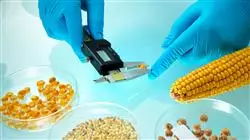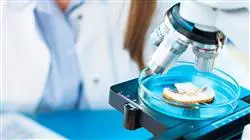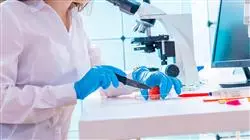University certificate
The world's largest faculty of nutrition”
Description
It is vital for nutritionists to keep up to date so they can successfully face new challenges in the profession”

This postgraduate certificate highlights the tools that guarantee food safety, which are mandatory and under the responsibility of producers, and which can be conducted either through the food industry's laboratory controls or by outsourcing the service to leading food laboratories that test raw materials and products.
Students will conduct an in-depth study of facility, personnel, laboratory techniques and equipment requirements, the quality parameters for food, materials and processes susceptible to analysis according to regulations, accepted quality control indexes, analytical techniques required for each product and the interpretation of results. Therefore, quality control in the food industry, by means of analytical tools and techniques, is essential in monitoring food batches to guarantee food safety, quality and safety, thus ensuring the continuous improvement of processes and products through integrated quality management.
This postgraduate certificate is taught by university professors and professionals from various disciplines in primary production, including the use of analytical and instrumental techniques for quality control, the prevention of accidental and intentional contamination and fraud, food safety/food integrity and traceability (food defence and food fraud/food authenticity). They are experts in food legislation and regulations on quality and safety, validation of methodologies and processes, digitalization of quality management, new foods research and development and, finally, coordinating and executing R&D&I projects.
This postgraduate certificate will be the ideal starting point to advance your career and become a prestigious professional”
This postgraduate certificate in Analytical Quality Control in the Food Industry contains the most complete and up-to-date scientific program on the market. The most important features include:
- Case studies presented by experts in food safety in the area of nutrition
- The graphic, schematic, and practical contents with which they are created, provide scientific and practical information on the disciplines that are essential for professional practice
- The latest information on Analytical Quality Control in the Food Industry
- Practical exercises where self-assessment can be used to improve learning
- Its special emphasis on innovative methodologies in Analytical Quality Control in the Food Industry
- Theoretical lessons, questions to the expert, debate forums on controversial topics, and individual reflection assignments
- Content that is accessible from any fixed or portable device with an Internet connection
Discover the Analytical Quality Control in the Food Industry and take a step forward in your career”
This program includes professional experts in the field, specialized in Analytical Quality Control in the Food Industry.
Its multimedia content, developed with the latest educational technology, will allow the professional a situated and contextual learning, that is, a simulated environment that will provide immersive information programmed to learn in real situations.
This program is designed around Problem-Based Learning, whereby the professional must try to solve the different professional practice situations that arise throughout the program. To that end, professionals will be assisted by a novel and interactive video system developed by renowned and experienced experts in Analytical Quality Control in the Food Industry.
You will identify the analytical techniques used on food and you will be in charge of managing adequate quality control in any company if you take this program"

One of the points you will study in depth will be establishing quality characteristics that raw materials, intermediate and finished products must comply with according to their origin"
Objectives
The postgraduate certificate in Analytical Techniques of Application in Quality is focused on providing nutritionists with the relevant knowledge for their professional development. For this purpose, exceptional professors have developed a quality syllabus with the latest developments in the industry. In this way, students will acquire throughout the course the skills to examine laboratory food regulations and standards or determine the requirements to be met according to ISO IEC 17025, among others.

Specialize with the certainty of receiving the most up-to-date contents based on the maximum scientific rigor in the industry”
General Objectives
- Examine the regulations and standards for food laboratories and define their role in food safety
- Analyze food safety regulations and standards applicable to raw materials and products in food laboratories
- Determine the requirements to be met by food analysis laboratories (ISO IEC 17025 Standard, applicable to the accreditation and certification of quality systems in laboratories)
- Recognize the consumer's right to acquire safe, healthy and innocuous food from the agrifood chain, both nationally and internationally
Specific Objectives
- Establish the quality characteristics to be met by raw materials, intermediate and finished products according to their origin, prior to their laboratory analysis
- Develop the relevant methodology for product conformity, taking into account the applicable requirements considered by the regulations and standards
- Define the most appropriate methodology for food quality assessment: integrity analysis and characterization, including the detection of biotic or abiotic food contaminants that may pose a health risk to consumers
- Describe food sampling depending on source, use and characteristics or specifications
- Identify and recognize the analytical techniques used in food and manage an adequate quality control
- Describe the main agri-food contaminants and learn about the application of analytical techniques by observing the sector to which they belong
- Outline the process for identifying and ensuring the safety of raw materials, processed foods and the suitability of water in the production of safe products for food and feed

A path to achieve knowledge and professional growth that will propel you towards a greater level of competitiveness in the employment market”
Postgraduate Certificate in Analytical Techniques of Application in Quality Control in the Food Industry
Quality control in the food industry is essential to guarantee the safety and quality of the products we consume. In this sense, analytical techniques are key tools to evaluate production processes and ensure customer satisfaction. If you want to get into this field, in TECH, the largest digital university in the world, you will find the Postgraduate Certificate in Analytical Techniques of Application in Quality Control in the Food Industry which, in addition to addressing in its curriculum the most updated content, includes a unique online methodology in the market. In this program, designed by the best specialists in the sector, you will learn the most commonly used techniques in the food industry, from sensory evaluation and chromatography to spectroscopy and microbiology. In addition, you will learn how to interpret and analyze the results obtained by these techniques, which will allow you to make informed decisions to improve product quality.
Specialize in analytical techniques applied to quality control in the food industry.
The food industry is one of the most regulated industries worldwide, as the quality of food products is a constant concern for manufacturers and consumers. Therefore, industry professionals must be prepared to face the challenges of maintaining high quality standards in their products. Thanks to this training offered by TECH, you will be empowered to apply analytical techniques in your daily work and thus, make decisions based on objective and accurate data. Here, you will have the necessary tools to continue updating yourself in this constantly evolving field. All this will allow you to apply analytical techniques in quality control and improve the quality and safety of products consumed worldwide.







